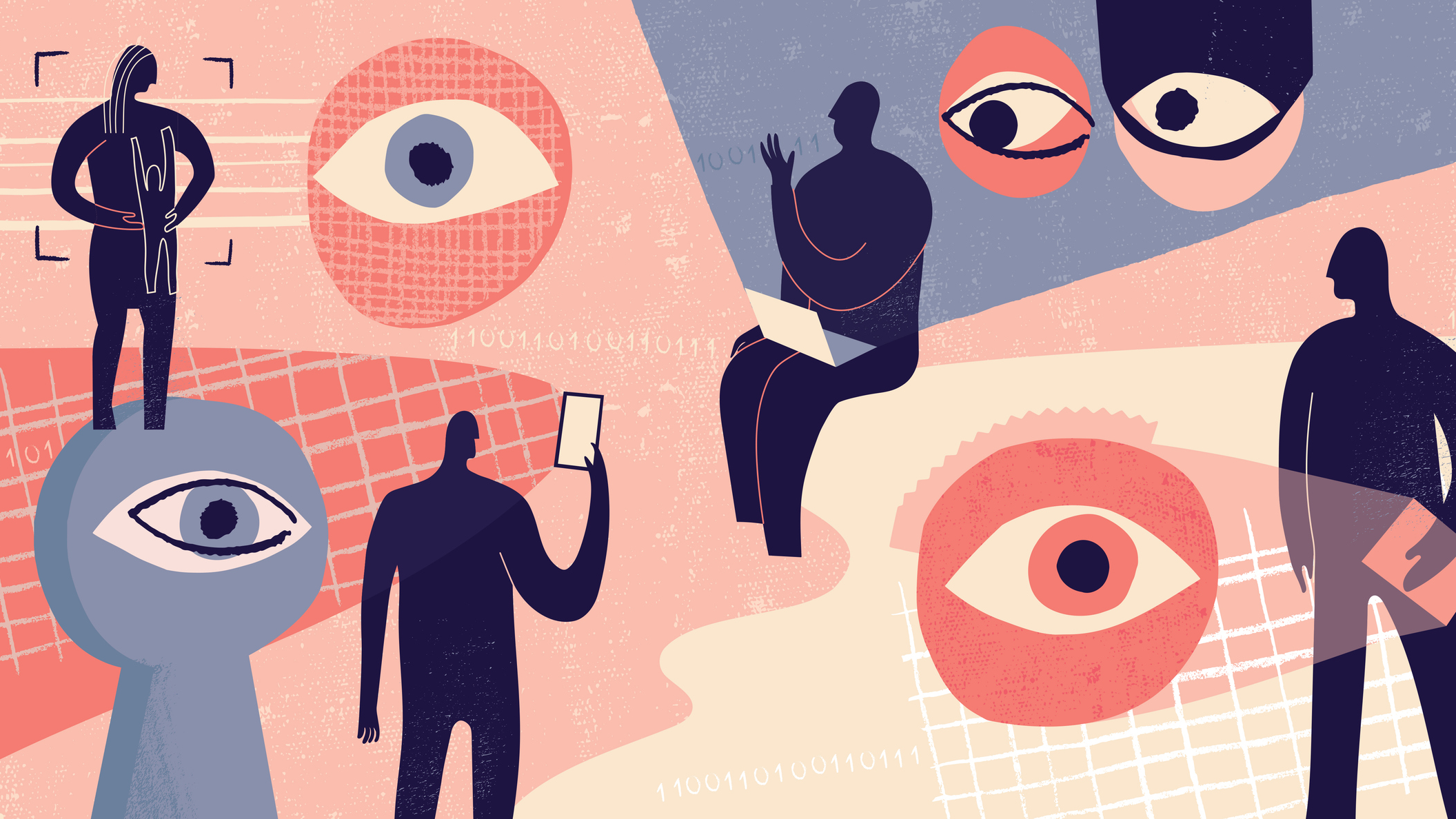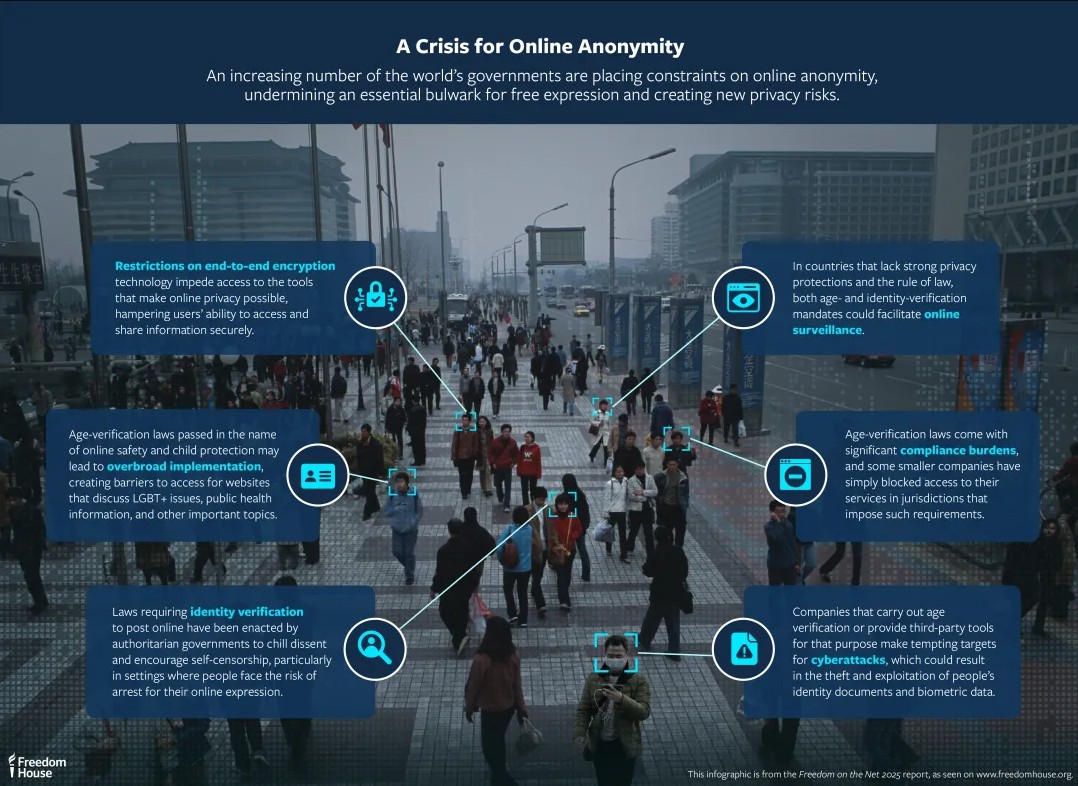From age verification to weakening encryption: 2025 saw a decline in online anonymity everywhere
Internet freedoms have worsened for the 15th consecutive year

Sign up for breaking news, reviews, opinion, top tech deals, and more.
You are now subscribed
Your newsletter sign-up was successful
- Internet freedoms have worsened yet again in 2025
- Online anonymity is increasingly under attack globally
- VPNs are also a target
Internet freedoms continued to decline in 2025, marking the 15th consecutive year of worsening conditions, according to Freedom House's new report.
The report reveals that the internet is now more controlled than ever before, with "an increasing number of the world’s governments are placing constraints on online anonymity," Freedom House noted.
In this context, the use of censorship-resistant technology, including the best VPN services, has become crucial. At the same time, though, VPN use is increasingly under attack.
That's why, in a report released last June, Freedom House and the European University Institute investigated restrictions on censorship circumvention tools.
"We found that out of the 72 Freedom on the Net countries, authorities in 21 have sought to block access to VPNs or censorship circumvention tools within the past five years," confirmed Freedom House's Senior Research Analyst, Kian Vesteinsson.
Online anonymity is under attack

In this year's Freedom of the Net report, researchers focused on the global decline in online anonymity.
It's concerning, according to Freedom House, because "restrictions on anonymity pose a direct threat to online privacy, free expression, and access to information, and could further carve up the global internet based on varying domestic rules for participation."
One particularly significant constraint includes moves by countries like the UK, multiple US states, Italy, and (soon) Australia to enforce mandatory age verification.
While these laws are meant to protect children online, experts have warned against the unintended consequences for people's data privacy, security, and free speech.
A hack of the third-party services Discord uses for age verification in the UK resulted in the breach of 70,000 users' identity documents, serving as a stark reminder of the security risks that come with age checks.
"This risk is already present and in front of us," said Vesteinsson. "Policymakers should instead seek options that bridge child protection and fundamental rights."
Vietnam and China went even further, enacting legislation that requires identity verification just to post content on social media.
During the report's coverage period (June 2024-May 2025), Freedom House also found that "governments from across the democratic spectrum placed limits on tools that make online privacy possible."
Measures include the UK serving an encryption backdoor order to Apple, a demand that provoked the Big Tech giant to remove its advanced end-to-end encryption protection for iCloud.
Globally, between January 2020 and March 2025, people in 17 of the 72 countries covered by the Freedom on the Net report experienced blocks on end-to-end encrypted communication platforms, such as Signal and Proton Mail.
VPNs and encryption − the main target
Once again, Freedom House has depicted a grim picture of how the internet is changing.
Virtual private networks (VPN) and encrypted messaging apps are becoming vital tools for promoting digital rights worldwide. However, they are increasingly the target of governments, including those in Western democracies.
For the first time, some US States − including Wisconsin and Michigan − are considering an obligation to block VPN traffic to make their age verification law more effective. At the same time, the UK's communications regulator, Ofcom, confirmed to TechRadar that it had begun monitoring VPN usage.
Encrypted messaging apps are also increasingly under threat in Europe as lawmakers keep pushing for the controversial Chat Control bill with a new proposal, despite continuous backlash from the privacy and cybersecurity industries.
"This trend is persistent but not irreversible," said Annie Boyajian, president of Freedom House. "It is clear, however, that we have reached a critical moment, and that the deterioration won’t stop unless governments and the private sector do more to protect internet freedom."
Follow TechRadar on Google News and add us as a preferred source to get our expert news, reviews, and opinion in your feeds. Make sure to click the Follow button!

Chiara is a multimedia journalist committed to covering stories to help promote the rights and denounce the abuses of the digital side of life – wherever cybersecurity, markets, and politics tangle up. She believes an open, uncensored, and private internet is a basic human need and wants to use her knowledge of VPNs to help readers take back control. She writes news, interviews, and analysis on data privacy, online censorship, digital rights, tech policies, and security software, with a special focus on VPNs, for TechRadar and TechRadar Pro. Got a story, tip-off, or something tech-interesting to say? Reach out to chiara.castro@futurenet.com
You must confirm your public display name before commenting
Please logout and then login again, you will then be prompted to enter your display name.